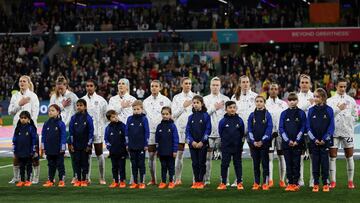2023 WOMEN WORLD CUP
UN appeals to FIFA to guarantee equal prize money for the upcoming Women’s World Cup
The United Nations call on FIFA to fulfil its commitment and grant equal prize money for the Women’s World Cup.

During the ongoing Women’s World Cup, United Nations Women has partnered with FIFA to champion gender equality, a message prominently displayed on captains’ armbands.
Jennifer Cooper, the UN Women’s sports division lead, has emphasized the significance of holding FIFA accountable for their commitment to achieving parity in prize money by the 2027 Women’s World Cup. Cooper, in collaboration with the players’ union FIFPRO, is dedicated to ensuring that FIFA follows through on its pledge. But, she recognizes that attaining equal compensation across all national federations under FIFA’s governance will require time and transparency in fund allocation.
What’s the prize pool at the 2023 Women’s World Cup?
FIFA has substantial financial reserves exceeding $3.8 billion that could be leveraged to augment the Women’s World Cup funding. And while The governing body’s president, Gianni Infantino, has called upon sponsors and broadcasters to increase their investment in women’s football, aiming to bridge the financial divide, the Women’s World Cup prize pool remains notably smaller than that of the men’s tournament. The $110 million shared among the 32 women’s teams contrasts with the $440 million distributed to men’s teams in the 2022 Qatar tournament.
Related: Megan Rapinoe criticized for this viral video
Advancing Women’s Football
UN Women commends FIFA’s endeavors to hasten equity in prize money while concurrently urging the implementation of additional initiatives to bolster the global growth of women’s football. Despite the headway, challenges persist, including apprehensions regarding the effective distribution of allocated funds to players.
FIFA has additionally aimed to establish a precedent by guaranteeing players a minimum earnings threshold for their participation in the World Cup, ranging from $30,000 for early exits to $270,000 for the champions.
“[Players] are not earning enough to support themselves and their families from the sport that they play,” said Ms Cooper.
Cooper emphasizes the essential support required for women’s national teams, emphasizing that the accelerated progress in prize money parity is a positive stride towards broader gender inclusivity within football.
“It’s a little bit slower than what we see at the level of this top prize money. But at the same time, I see that the accelerated pace of change is very encouraging.”
The progression of women’s football has encountered historical obstacles, yet as highlighted by UN Women, it is an important time for strategic investment in the sport to cultivate a more balanced playing field.






